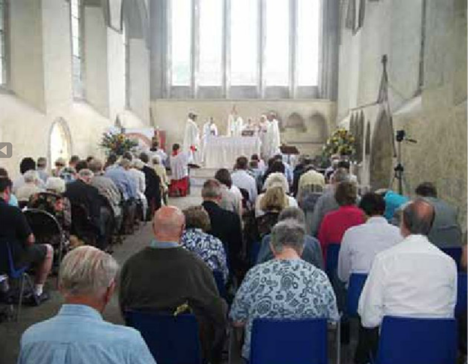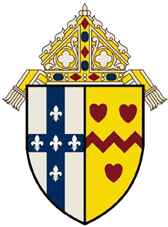Our Story
When the Ordinariate of Our Lady of Walsingham was erected in January 2011, there were already groups of Anglicans throughout England preparing to leave the Church of England and enter the Catholic Church bringing with them their Anglican liturgical, pastoral and spiritual traditions. They ceased to worship in their Anglican parish churches on Ash Wednesday that year, intensified their preparation, and were received as Catholics in Holy Week.
The groups were not evenly distributed across the country. Although there were a considerable number of groups in the South East of the country, there was a surprising sparsity of groups in Sussex. East Sussex had one group only, in Eastbourne, and West Sussex had not a single group.
Things were not to remain that way. On 13th March 2013, a member of the Friends of the Ordinariate living in Goring, a suburb of Worthing, organised a meeting for the benefit of Catholics in Worthing at “The Barn”, the church hall of the church of English Martyrs, Goring, to enable them to learn about the Ordinariate. The principal speaker was Fr. Neil Chatfield, the pastor of the Eastbourne group. The meeting also benefitted from the attendance of Fr. Graham Smith, an Ordinariate priest who founded the Ordinariate Group in Bournemouth in 2011 and had moved to West Sussex in 2011, and Mgr. Robert Mercer, C.R., who was assisting at St. Agatha’s Portsmouth (as he still does), but living in Worthing. The meeting was well attended, and resulted in a pleasing sum of money being raised for the Friends of the Ordinariate, and one new member of the Friends being enrolled from English Martyrs parish. The meeting tried hard to keep its mind on the subject in hand, but was somewhat distracted by the fact that Pope Francis was elected in Rome just before the meeting was due to start!
Following on from that meeting, a pilgrimage to Walsingham in June 2013 arranged by Fr. Graham Smith and the Catholic parish of St. Richard, Chichester, where he was assisting, attracted Ordinariate and diocesan Catholics from Bournemouth, Chichester and Goring.

The next key event, prior to the setting up of the Chichester Group was a mass celebrated in the church of the former Franciscan friary in Chichester. The Friary had been dissolved by Henry VIII in 1538, but the church had survived because it was used for City Council meetings, and as a courthouse. No Christian worship had taken place there since the Dissolution. Fr. Graham discussed his idea for a celebration there with Fr. Jonathan Redvers Harris and Fr. Neil Chatfield. The three priests agreed that a mass celebrated there would be a very good venture in itself, and would serve to place the Ordinariate on the map. Fr. Graham negotiated with Chichester City Council, who own the building, and the church was full for the Mass which took place on August 11th 2013 (see photo). A lot of hard work went into the preparations, as the necessary church furnishings, including altar and Communion rails, had to be imported from far and wide.
As time went by a number of isolated individual former Anglicans in West Sussex were admitted to the Ordinariate, and it began to look as though a West Sussex Ordinariate Group might be viable. The group would need support in the early stages from the Eastbourne and Isle of Wight/Portsmouth groups, and the pastors of those groups promised their support. The Bishop of Arundel and Brighton agreed to the group being based at St. Richard’s parish church, Chichester, and the first mass was arranged for Saturday afternoon 4th May 2014.
The first mass of Sunday has been celebrated every Saturday afternoon according to the Ordinariate Use since that date. The group was officially dependent on the Eastbourne Group until October 2014, at which point the Ordinary agreed to its being a group in its own right.
Whilst the group is small, its members have high hopes for the future, and are conscious that it must pursue a mission to the community in which it is set.

